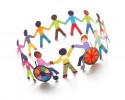Inclusivity for the Differently Abled: Much Done and Much to be Done

There has been great progress made to make the world a more inclusive place. We have witnessed greater exposure and acceptance of sexuality, gender, and abilities that do not conform to preconceived norms. However, that progress can easily be mistaken as success. Although much as changed, there is still far more that has to be done for genuine inclusivity. People who are differently abled still face many obstacles despite the social narrative of progress. It is necessary to make ourselves aware of these social shortcomings in order to address the problem and find a solution.
One in seven people around the world have some form of disability, according to the World Health Organization. People of different abilities are a critical part of the fabric of our society. Yet, there are still many countries with laws that restrict those with disabilities in terms of marriage, housing, and healthcare. These important decisions are legally handed to guardians instead of the individual. Despite the progress made, there is still a prevalent mindset that those with disabilities are to be pitied. They are viewed as charity projects as opposed to human beings with thoughts and wants like anyone else. This results in progress being stalled in ways we may not fully realize.
Modern technology is advancing at a breakneck pace. We are on the verge of artificial intelligence on the same level of the human brain, automation that will replace countless jobs, and power sources far beyond what was capable a mere century ago. These are resulting in mind-blowing advancements for many, but those with disabilities are not truly reaping those benefits. Innovation of mobility devices has been surprisingly slow, with the same prototype for the modern wheelchair still being used since 1933. A lot has changed since the 1930s in unbelievable ways, but for many people things have remained very much the same.
These issues persist because the issue goes beyond discrimination. Even in progressive cities and countries, simply doing away with discrimination is not enough. We must push for policies and changes that do away with the structures that hold certain people back. These barriers range from the assumptions we make when we see someone who uses canes when walking, to assuming that a small set of stairs leading to a public space is not an issue. Mobility Unlimited is a global initiative looking to change that by having inventors and technologists submit ideas that can transform mobility for those afflicted with lower-limb paralysis. Initiatives such as that one, as well as Austria requiring that 4% of all jobs be filled by those with long-term disabilities, help move things in the right direction. But it will take persistent similar steps to truly solve the problem.
With the amazing strides seen in modern technology, advancements made for the differently abled, and the improved attitudes regarding inclusivity, it is easy to mistake progress for success. We cannot afford to fall for that trap. There is still much to be done to create a world of equality and inclusivity. It starts with awareness, which paves the path for new ways of thinking and concrete actions for genuine change. We must simultaneously cheer our progress and acknowledge our shortcomings. Transforming our ways of thinking, coupled with advancing technology, gives us the potential for a radically different and inclusive future. But we must choose to make it happen.
Sources:
Barriga, Shantha Rau. “We need to stop treating people with disabilities as less than human.” The Guardian. https://www.theguardian.com/global-development-professionals-network/2016/jun/20/we-need-to-stop-treating-people-with-disabilities-as-less-than-human
McFadden, Tatyana. “Technology has changed our world, but hasn’t done enough for people with disabilities.” CNN. https://www.cnn.com/2017/11/21/opinions/technology-can-help-people-with-disabilities-opinion/index.html
Saba, Roberto. “Around the globe, people with disabilities face unseen discrimination. We must do better.” The Conversation. http://theconversation.com/around-the-globe-people-with-disabilities-face-unseen-discrimination-we-must-do-better-70235





Leave a comment!